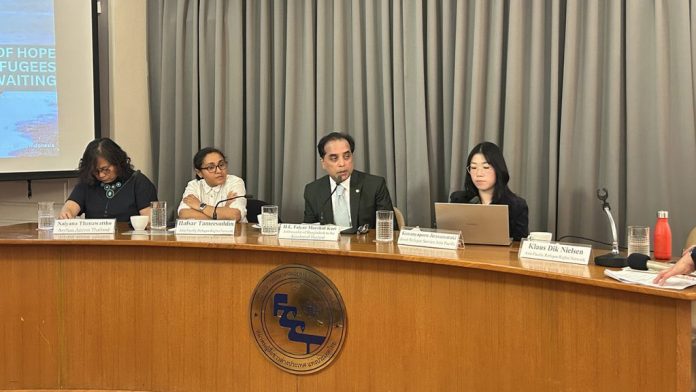Bangladesh Ambassador to Thailand Fayyaz Murshid Kazi said that the cancellation of international funding has had a negative impact on the quality of life of refugees in the Rohingya camp.
He said this at a discussion titled ‘A Light of Hope for Refugees in Waiting’ organized by the Foreign Correspondents’ Club of Thailand (FCCT) in Bangkok, Thailand’s capital, on Thursday (June 19).
The discussion was organized by the Asia Pacific Refugee Rights Network (APRRN), Caritas and Jesuit Refugee Service (JRS) Asia Pacific on the occasion of World Refugee Day 2025.
Fayyaz Murshid Kazi, Ambassador of the Bangladesh Embassy in Thailand, said that when you visit the Rohingya camps in Bangladesh, you can see that the children there are in good health. Women are also involved in various types of work. Despite legal constraints, men and women are seen involved in various jobs there.
He said, everything cannot be generalized due to some accidents. Just as it is true that Rohingyas are getting involved in crime in Cox’s Bazar, similarly locals may also want to take some advantage. However, at the same time, it should also be seen that the way locals and refugees fought together during Covid or cyclone is commendable. But we, the locals, are also in crisis.
The Rohingya crisis in Bangladesh is not from 2017. Rather, he mentioned that it is a problem of the last four decades.
Fayyaz Murshid said that the donation that has now been canceled has affected the education of 230,000 Rohingya students in UNICEF-run schools. It is difficult to ensure informal labor for the large Rohingya population in the two upazilas of Cox’s Bazar where the Rohingyas have taken refuge.
He expressed hope that the regional alliance of Southeast Asian countries, ASEAN, will play an important role in solving the Rohingya problem. He also said that resolving the Rohingya crisis is necessary to restore peace and trust in Myanmar.
Hafsar Tamisuddin, Co-Secretary General of the Asia Pacific Refugee Rights Network (APRRN), said that if refugees’ internal resources can be utilized, the overall management costs will also be reduced. He also called on governments to play a stronger role in resettlement and establishing the rights of refugees.
Nayana Thanawattho, Executive Director of Asylum Access Thailand, said that if refugees’ right to work is ensured, the local economy will also benefit.
Moderated by APRRN’s Claus Dik Nielsen, other speakers included Kunanyaporn Jirasamataki, Regional Advocacy and Communication Officer (Asia Pacific) of JRS, Akwam Fiajmi Hanifan, Journalist of Narasi Television in Indonesia, and Keya Saha Chowdhury, Regional Representative for Asia Pacific of the International Council of Voluntary Agencies (ICVA), among others.




